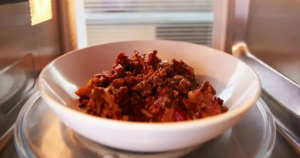
Some dishes should be eaten immediately after preparation. Storing them in the refrigerator or freezer for reheating can damage their health. In addition to their altered taste, they lose their nutrients and in some cases can become poisonous.
Here are 9 foods that should not be reheated to avoid stomach pain, digestive upset, or even food poisoning.
1. Potatoes
Potatoes can be a breeding ground for Clostridium botulinum (botulism) if they are not promptly refrigerated after you finish eating them.
Thirty seconds in the microwave will not kill botulism, so be careful.
2. Egg
Eggs are a protein-rich food and contain many different nutrients. However, heating an egg a second time to a high temperature changes the composition of the eggs and prevents them from being absorbed by the body. As a result, digestion becomes slow and difficult, and abdominal pain occurs.
3. Mushrooms
Mushrooms, which are rich in fiber and vitamins, contain protein that can be damaged if not stored properly. It is best to eat fresh mushrooms immediately after preparation, because mushroom proteins deteriorate quickly.
4. Rice
Raw rice has dangerous bacterial microorganisms that are resistant even to cooking. Rice should be consumed immediately after cooking.
Solution: It would be better to freeze leftover rice instead of storing it in the refrigerator. Better yet, cook only the amount needed to avoid waste.
5. Celery
Celery is a vegetable rich in fiber and antioxidants that are very good for health. However, this food contains nitrates which turn into nitrites when heated. These are compounds that can be dangerous for the body.
6. Celery, spinach, and beets
Rich in vitamins, antioxidants, iron, magnesium and fiber, this trio is a vegetable that provides many different benefits to the body. However, this dark green leafy vegetable contains large amounts of nitrates, which can turn into nitrites when stored at room temperature. Nitrites are likely to cause an increased level of methemoglobin in the blood, cause discoloration of the skin and mucous membranes, and in rare cases, cause death.
7. Chicken
Reheating cold chicken in the microwave causes the protein composition of the meat to change – and this can lead to digestive problems. Making a cold sandwich with leftover chicken is better than reheating it a second time.
8. Seafood
Seafood should be eaten as fresh as possible. Reheating seafood in the oven or microwave is not recommended. Seafood can spoil quickly and lead to food poisoning.





